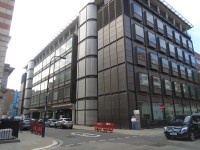Access Guide
Introduction
- Related link Macmillan Cancer Centre.
- Https://www.disabledgo.com/access-guide/university-college-london-hospitals-nhs-foundation-trust/macmillan-cancer-centre
-
Comments
View
- The distance from Euston Station to the Macmillan Cancer Centre is approximately 0.5 miles.
- The journey should take you approximately 9 minutes.
- The roads along this route are generally busy.
- The pavements may well be congested.
Euston Station
- There is step free access from the platforms to the entrance of the station.
- There are car park facilities at the station.
- There are toilets within the station.
- Exit the station onto Euston Square via a set of double doors with a width of over 150cm.
- As you exit the station there is a section of tactile flooring which can be seen in photograph 2.
- Which is immediately followed by a section of brick block paving which can be seen in photograph 3.
Euston Square / Euston Gardens - Euston Road
- Cross Euston Square and head towards Euston Gardens.
- Before heading through Euston Gardens to Euston Road.
- The distance from the Station to Euston Road is approximately 110m.
- The surface of the square is block paving.
- There are small drains along the way to the gardens which can be seen in photograph 2.
- There are bollards with a width of 114cm which can be seen in photograph 3.
- After approximately 60m there is an easy slope leading towards the gardens.
- There is a handrail to the right going down.
- It is not possible to use the handrail all the way down the slope as there is a tree in the way.
- The slope can be seen in photographs 5 and 6.
- At this point turn right and continue along the path for approximately 85m until you reach Euston Square.
- There is a slight uphill gradient.
- This part of the route can be seen in photographs 7, 8 and 9.
- Upon reaching Euston Square immediately turn left to reach the Euston Road pedestrian crossing as shown in photograph 10.
Euston Road / Gordon Street - Euston Road
- Use the pedestrian crossing to cross Euston Road before turning right and using another pedestrian crossing to cross Gordon Street.
- There are traffic lights at the pedestrian crossing.
- There are tactile dropped kerbs on either side of the road and on either side of the brick block paved central island.
- The crossing has light controls at a height of 100cm and rotating cones.
- Traffic approaches from the right on the near side and from the left on the far side of this very busy road.
- Cross at the traffic lights.
- After this immediately turn right and cross Gordon Street.
- There is a similar pedestrian crossing located here, though the island surface consists of tactile block paving and is level with the road.
Euston Road - Gower Street
- After crossing Gordon Street continue down Euston Road for approximately 170m until you reach Gower Street.
- The pavement is block paving with the occasional manhole cover.
- There is a slight uphill gradient to the road.
- The pavement is often congested.
Gower Street - Euston Road
- Cross Gower Street at the pedestrian crossing.
- There are traffic lights at the pedestrian crossing.
- There are tactile dropped kerbs on either side of the road and on either side of the brick block paved central island.
- The crossing has light controls at a height of 100cm and rotating cones.
- Traffic approaches from the right on the near side and from the left on the far side of this very busy road.
- Cross at the traffic lights.
Gower Street - Grafton Way
- Turn left after crossing Gower Street and head along Gower Street until you reach Grafton Way.
- The surface of the pavement is block paving and there is an occasional manhole cover.
- There is a slight gradient heading downwards to the road.
- There is a tarmac service road after 55m with tactile pavement on either side as shown in photograph 4.
Gower Street - Huntley Street
- After crossing Gower Street turn right and continue for 55m until you reach the zebra crossing across Grafton Way.
- The surface of the pavement is block paving with the occasional manhole.
- There is a slight gradient downhill towards the road.
- After 35m you will pass the entrance to the Elizabeth Garrett Anderson Wing.
- There is a zebra crossing across the road.
- The surface of the road is tarmac.
- There is tactile paving on either side of the road.
- After crossing the road turn right and continue for 20m to reach Huntley Street.
Huntley Street - Macmillan Cancer Centre Entrance
- Turn left and head along Huntley Street for 140m to reach the Macmillan Cancer Centre Entrance.
- At the time of the survey (July 2017), there was construction work obstructing the road as you turn left, reducing the width of the pavement to 63cm.
- This can be seen in photograph 2.
- To avoid this you can head onto the road and around this, returning to the pavement via the steep ramp shown in photograph 3.
- Continue along Huntley Street for 100m to University Street.
- The surface of the pavement is tarmac.
- Cross University Street when you reach it.
- The road is tarmac and has paving on each side and can be seen in photographs 5, 6 and 7.
- Turn right and cross Huntley Street.
- After crossing the road turn left and continue for 40m.
Outside Access (Main Centre Entrance)
-
Entrance Details
View
- This information is for the entrance located on Huntley Street.
- The entrance area/door is clearly signed.
- There is step free access at this entrance.
- There is a canopy or recess which provides weather protection at this entrance.
- The entrance door(s) does not/do not contrast visually with its immediate surroundings.
- The main door(s) open(s) automatically (towards you).
- The main automatic door(s) is/are push pad activated.
- The door(s) is/are single width.
- The width of the door opening is 102cm.
- There is a second set of doors.
- The door(s) open(s) automatically.
- The automatic door(s) is/are push pad activated.
- The door(s) is/are double width.
- The width of the door opening is 300cm.
-
Comments
View
- The single automatic doors are push pad operated.
- Between the two sets of push pad operated doors is an automatic revolving door with an opening width of 152cm.


